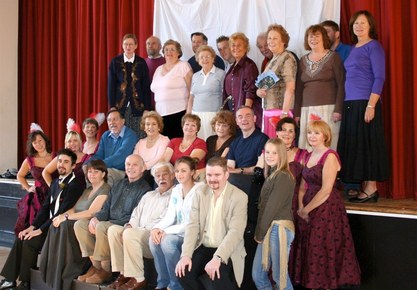The Merry Widow
28 OCTOBER 2005
Click on a photo below to view it |
"A word on the beautiful tableaux, particularly at the beginning of Act 2 – wonderful! A colourful and enjoyable evening."....writes Stewart Adkins (NODA Reviewer).
The action of The Merry Widow takes place in Paris, and in particular the ballroom of the Pontivedrian Embassy. The Ambassador, Baron Zeta, has a problem on his, mind. He must find a way to save his country from bankruptcy. One solution is to prevent the rich and beautiful heiress Anna Glavari from marrying a foreigner. He has decided that Count Danilo, an embassy attaché would be the ideal bridegroom, and the purpose of the party we are witnessing is to bring the two together. But all is not going to plan.......
Read a review of this show below
The Merry Widow, Ingatestone Musical & Operetta Group, November 2, 2005 Director – Betty Moore Musical Director – Sue Stewart Playing to a pleasingly full house this Lehar classic began with a brief overture, albeit long enough to become attuned to the seven piece band rather than a fuller orchestra. After my acclimatisation the band blended seamlessly with the singing on-stage so that the musical impact was well balanced throughout. All three acts saw excellent use of the stage including the apron at the front and the rostra at the back. The ballroom gowns in Act 1, the Ponetevedrian national costumes in Act 2 and the Grisettes dress in Act 3 were all beautiful but some of the men could perhaps have used braces (and therefore slightly longer waistcoats) to prevent the sagging trouser bottoms, which spoilt the effect a little in Act 1. That said, the experienced male chorus were excellent in Act 1, reacting enthusiastically to all the dialogue and making the most of their opportunities to interact with the principals. Characterisation of the jealous husband, Kromov and the two functionaries, St Brioche and Cascada, each vying for the affections (and money) of the wealthy widow, was good, providing plenty of good clean fun. Accents were sufficient to suggest Eastern European without resorting to Russian stereotypes and the diction was clear. Baron Zeta was excellent as the trusting husband with exaggerated duty to the fatherland, and his factotum, Njegus, looking like a quizzical Omar Sharif, extracted good laughs from his lines. Valencienne made a very convincing tease for Camille, since she sang beautifully and strongly, and was clearly a very pretty young girl. The smiles in Act 3 banished the more hesitant approach in previous Acts. Camille had a very fine tenor voice and his manipulation by Valencienne and his subsequent confusion/frustration at having to indulge in her subterfuge was well played without exaggeration. Danilo was suitably young and handsome and played the debonair role generally well when with the chorus or alone. Madame Glavari had a lovely voice and fully understood the playful sarcasm that her character required. I had some reservations about the relationship between Danilo and Glavari, which, although argumentative, somehow lacked tension and the frisson that should have been evident. The usual inevitability of the “I love you waltz” rapprochement was a little perfunctory. That said, the whole effect worked and the sextet at the end of Act 2 (if memory serves) was superb and brought a tear to the eye. Choreography throughout was interesting and varied, with dancing in Vilia outstanding (to complement excellent solo singing) and the lovely smiling solo female dancer deserves mention. Grisettes were great and showed a wonderful lack of inhibition. The men were a little shambolic in “Women” but ‘twas ever thus with men in this production number. A penultimate word on the beautiful tableaux, particularly at the beginning of Act 2 – wonderful! The final word must go to the younger principal performers, two of whom, I am told, were experiencing their first stage roles. I hope to see more of you in future and trust my comments are taken as constructive, since they are clearly meant to be. A colourful and enjoyable evening. Reviewer – Stewart Adkins |



























